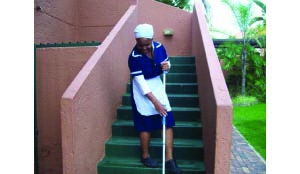 YES, the topic on domestic workers has generated interesting responses from a number of readers and I am hopeful that the information being shared through this column will lead to some meaningful changes in many homes.
YES, the topic on domestic workers has generated interesting responses from a number of readers and I am hopeful that the information being shared through this column will lead to some meaningful changes in many homes.
From the feedback I have received, one thing is clear. There have been misunderstandings on this matter stemming from a lack of information on the privileges for this category of workers.
So, allow me dear readers to state the other entitlements for domestic helps, besides the ones I referred to last week, which are contained in Statutory Instrument (SI) No. 3 of 2011 which stipulates the minimum wages and conditions of employment for domestic workers.
There is also the Minimum Wages and Conditions of Employment (Domestic Workers) as contained in SI No. 45 of 2012.
I gave the definition of a domestic worker, an employer, minimum conditions of employment, as well as the minimum wage for this group of employees.
There was also reference to paid public holiday, summary dismissal, the minimum wage for a domestic worker, transport allowance, the number of hours a house servant is supposed to work, and annual leave.
Today I will discuss paid sick leave, maternity leave, separation package, protective clothing and child labour.
Paid sick leave
A domestic worker who is unable to execute the domestic worker’s duties due to illness or accident not occasioned by the default of the domestic worker shall, on production of a medical certificate from a registered medical doctor or health facility designated by the employer, be granted paid sick leave at full pay for a period not exceeding one month.
Where a domestic worker does not recover from illness or accident after one month from the date of illness or accident, the employer may discharge the domestic worker, whereupon the domestic worker’s entitlement to sick leave shall cease.
A female domestic worker will be granted leave of absence without loss of pay to enable her nurse a sick child who has been hospitalised if, due to the nature of illness, the child requires special attention.
The employer may, before granting such leave, require the domestic worker to produce a certificate from a health facility as evidence that the child is sick and requires special attention.
Days taken as leave under this provision shall not be deducted from the domestic worker’s accrued leave days.
Maternity leave

•A female domestic worker will be granted leave of absence without loss of pay to enable her nurse a sick child who has been hospitalised.
A female domestic worker shall be entitled to 120 calendar days maternity leave on production of a medical certificate signed by a registered medical doctor if the domestic worker has completed two years of continuous service from the date of first engagement or since the last maternity leave was taken.
The maternity leave granted would be in addition to any other leave to which the domestic worker may be entitled.
Where, by reason of illness due to pregnancy, a female domestic worker becomes temporarily incapable of performing duties, the domestic worker would be entitled to sick leave in accordance with paragraph 9.
An employer would not impose any penalty or disadvantage upon a domestic worker for reasons connected with the domestic worker’s pregnancy.
A domestic worker would not be entitled to receive a salary during the time that she is on maternity leave.
Separation package
Where a domestic worker’s contract is terminated by any reason other than by resignation or summary dismissal, the domestic worker would be entitled to separation benefits of not less than one month’s basic pay for every two completed years of service and any other dues.
Protective clothing
A domestic worker who does any work likely to be injurious to them would be provided with protective clothing.
Prohibition of child labour
A person shall not employ a child as a domestic worker.
It is important to learn from the SI that domestic workers have rights that govern their duties, and employers have a responsibility to master these.
One thing that is certain in many countries, including the developed world, is that house helps are generally excluded from national labour legislation.
Peggie Smith, an employment law expert, notes that nearly two-thirds of domestic service workers polled in a study in California, United States of America, indicated that they considered their jobs hazardous, while three-quarters stated that they did not receive basic protective gear to help prevent workplace injuries and illnesses.
A majority of workers reported that they had not received training in job safety or injury prevention.
Smith added that the need for regulation was especially pressing among domestics who provide home-care services for elderly and disabled individuals.
She also observed that many households that employ domestics want to treat their domestics fairly, but often lack awareness about how to affect positive change.
Smith has offered some solutions which include providing domestics with protective gloves and masks when using harmful cleaning agents.
I agree with her that a critical step to help improve health and safety is educating household employers about the conditions in domestic service and strategies to improve those conditions.
As Zambia prepares to celebrate Labour Day, it will be necessary to reflect on domestic workers because they an integral part of many households in the country.
The theme for this year’s Labour Day is ‘Promoting national economic growth through job creation, free collective bargaining and respect of workers’ rights’. Remember that domestics have rights, too.
For now, let us keep this link open as we share matters on labour and employment.
(This column is an initiative of the Ministry of Labour and Social Security. For comments or questions, email info@mlss.gov.zm or niza12001@yahoo.com)






